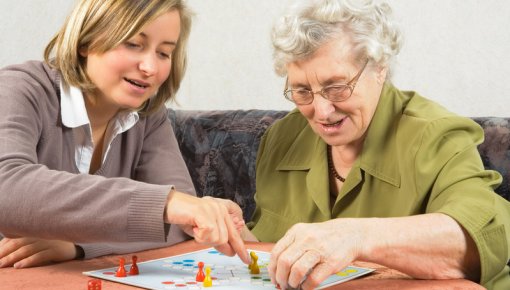Bahar-Fuchs A, Martyr A, Goh AM et al. Cognitive training for people with mild to moderate dementia. Cochrane Database Syst Rev 2019; 3: CD013069.
Ball EL, Owen-Booth B, Gray A et al. Aromatherapy for dementia. Cochrane Database Syst Rev 2020; (8): CD003150.
Burckhardt M, Herke M, Wustmann T et al. Omega-3 fatty acids for the treatment of dementia. Cochrane Database Syst Rev 2016; (4): CD009002.
Cheston R, Ivanecka A. Individual and group psychotherapy with people diagnosed with dementia: a systematic review of the literature. Int J Geriatr Psychiatry 2017; 32(1): 3-31.
Deshmukh SR, Holmes J, Cardno A. Art therapy for people with dementia. Cochrane Database Syst Rev 2018; (9): CD011073.
Du Z, Li Y, Li J et al. Physical activity can improve cognition in patients with Alzheimer's disease: a systematic review and meta-analysis of randomized controlled trials. Clin Interv Aging 2018; 13: 1593-1603.
Farina N, Llewellyn D, Isaac MG et al. Vitamin E for Alzheimer's dementia and mild cognitive impairment. Cochrane Database Syst Rev 2017; (4): CD002854.
Forbes D, Forbes SC, Blake CM et al. Exercise programs for people with dementia. Cochrane Database Syst Rev 2015; (4): CD006489.
Goris ED, Ansel KN, Schutte DL. Quantitative systematic review of the effects of non-pharmacological interventions on reducing apathy in persons with dementia. J Adv Nurs 2016; 72(11): 2612-2628.
Hill NT, Mowszowski L, Naismith SL et al. Computerized Cognitive Training in Older Adults With Mild Cognitive Impairment or Dementia: A Systematic Review and Meta-Analysis. Am J Psychiatry 2017; 174(4): 329-340.
Huang HC, Chen YT, Chen PY et al. Reminiscence Therapy Improves Cognitive Functions and Reduces Depressive Symptoms in Elderly People With Dementia: A Meta-Analysis of Randomized Controlled Trials. J Am Med Dir Assoc 2015; 16(12): 1087-1094.
Huntley JD, Gould RL, Liu K et al. Do cognitive interventions improve general cognition in dementia? A meta-analysis and meta-regression. BMJ Open 2015; 5(4): e005247.
Institute for Quality and Efficiency in Health Care (IQWiG, Germany). Dementia Care Management. Evidence search for the S3 guideline on dementia. Commission V20-03C. 2021. IQWiG reports; Volume 1044.
Institute for Quality and Efficiency in Health Care (IQWiG, Germany). Cognitive training / cognitive stimulation. Evidence search for the S3 guideline on dementia. Commission V20-03A. 2021. IQWiG reports; Volume 1083.
Institute for Quality and Efficiency in Health Care (IQWiG, Germany). Non-drug therapies in Alzheimer´s disease: Final report. Commission A05-19D. 2009.
Institute for Quality and Efficiency in Health Care (IQWiG, Germany). Technical support systems. Evidence search for the S3 guideline on dementia. Commission V20-03B. 2021. IQWiG reports; Volume 1036.
Jia RX, Liang JH, Xu Y et al. Effects of physical activity and exercise on the cognitive function of patients with Alzheimer disease: a meta-analysis. BMC Geriatr 2019; 19(1): 181.
Korczak D, Habermann C, Braz S. The effectiveness of occupational therapy for persons with moderate and severe dementia. GMS Health Technol Assess 2013; 9: Doc09.
Law CK, Lam FM, Chung RC et al. Physical exercise attenuates cognitive decline and reduces behavioural problems in people with mild cognitive impairment and dementia: a systematic review. J Physiother 2020; 66(1): 9-18.
Leung P, Orrell M, Orgeta V. Social support group interventions in people with dementia and mild cognitive impairment: a systematic review of the literature. Int J Geriatr Psychiatry 2015; 30(1): 1-9.
Li X, Guo R, Wei Z et al. Effectiveness of Exercise Programs on Patients with Dementia: A Systematic Review and Meta-Analysis of Randomized Controlled Trials. Biomed Res Int 2019: 2308475.
Möhler R, Renom A, Renom H et al. Personally tailored activities for improving psychosocial outcomes for people with dementia in community settings. Cochrane Database Syst Rev 2020; (8): CD010515.
Park K, Lee S, Yang J et al. A systematic review and meta-analysis on the effect of reminiscence therapy for people with dementia. Int Psychogeriatr 2019; 31(11): 1581-1597.
Petersson SD, Philippou E. Mediterranean Diet, Cognitive Function, and Dementia: A Systematic Review of the Evidence. Adv Nutr 2016; 7(5): 889-904.
Rijpma A, Meulenbroek O, Olde Rikkert MG. Cholinesterase inhibitors and add-on nutritional supplements in Alzheimer's disease: a systematic review of randomized controlled trials. Ageing Res Rev 2014; 16: 105-112.
Travers C, Brooks D, Hines S et al. Effectiveness of meaningful occupation interventions for people living with dementia in residential aged care: a systematic review. JBI Database System Rev Implement Rep 2016; 14(12): 163-225.
Van der Steen JT, Smaling HJ, van der Wouden JC et al. Music-based therapeutic interventions for people with dementia. Cochrane Database Syst Rev 2018; (7): CD003477.
Woods B, O'Philbin L, Farrell EM et al. Reminiscence therapy for dementia. Cochrane Database Syst Rev 2018; (3): CD001120.
Zafra-Tanaka JH, Pacheco-Barrios K, Tellez WA et al. Effects of dog-assisted therapy in adults with dementia: a systematic review and meta-analysis. BMC Psychiatry 2019; 19(1): 41.
Zhang Y, Cai J, An L et al. Does music therapy enhance behavioral and cognitive function in elderly dementia patients? A systematic review and meta-analysis. Ageing Res Rev 2017; 35: 1-11.
Zhu XC, Yu Y, Wang HF et al. Physiotherapy intervention in Alzheimer's disease: systematic review and meta-analysis. J Alzheimers Dis 2015; 44(1): 163-174.
IQWiG health information is written with the aim of helping people understand the advantages and disadvantages of the main treatment options and health care services.
Because IQWiG is a German institute, some of the information provided here is specific to the German health care system. The suitability of any of the described options in an individual case can be determined by talking to a doctor. informedhealth.org can provide support for talks with doctors and other medical professionals, but cannot replace them. We do not offer individual consultations.
Our information is based on the results of good-quality studies. It is written by a team of health care professionals, scientists and editors, and reviewed by external experts. You can find a detailed description of how our health information is produced and updated in our methods.

